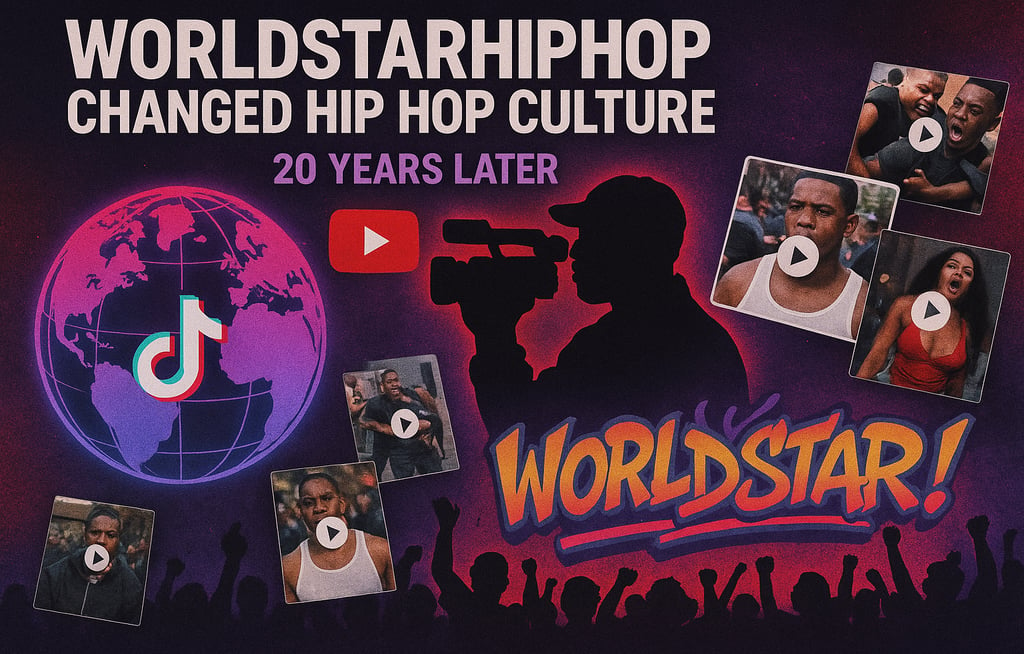WorldStarHipHop Changed Hip Hop Culture: 20 Years Later
8/17/20253 min read


Twenty years after its 2005 launch, WorldStarHipHop stands as one of the most controversial yet influential platforms in hip hop history. What began as Lee "Q" O'Denat's music website transformed into a cultural phenomenon that fundamentally altered how hip hop content is consumed, shared, and monetized in the digital age.
From Music Portal to Viral Video Empire
WorldStarHipHop initially focused on music content, but O'Denat recognized the shifting digital landscape in 2007. "When YouTube signed with Google, I just figured, this is the future," he explained. "I knew with the camera phones coming out, now everyone can be a cameraman, [a] director". This prescient pivot toward user-generated viral content would define the platform's legacy.
The site quickly became notorious for hosting shock videos, fight footage, and controversial content that traditional media wouldn't touch. By 2011, WorldStarHipHop averaged 1.2 million unique visitors daily, establishing itself as a digital powerhouse.
The "WorldStar!" Phenomenon
Perhaps no single platform has influenced internet behavior quite like WorldStarHipHop. The site created a cultural feedback loop where people began filming incidents specifically for viral potential. "The site's popularity has created a sort of voyeuristic feedback loop, in which disassociated bystanders immediately videotape shocking incidents and act as if they're already watching a video on the Internet," noted Gothamist's John Del Signore.
The phrase "WorldStar!" became a rallying cry shouted during confrontations, transforming the platform name into both a meme and cultural battlecry. This phenomenon represented a fundamental shift in how spontaneous events were documented and distributed.
Breaking Artists and Shaping Careers
Beyond viral videos, WorldStarHipHop evolved into a legitimate artist development platform. O'Denat claimed the site helped launch careers of artists like Chief Keef and French Montana. In 2008, the platform exclusively premiered its first major music video with Ace Hood and DJ Khaled's "Cash Flow," signaling its transition into serious music promotion.
"Q said Khaled saw we were growing fast and we got that first exclusive video and that kind of made people realize we just didn't have crazy videos but we premiered music videos too," according to platform insiders. Over time, the site helped break emerging artists including 6ix9ine and YBN members.
Cultural Impact and Controversy
WorldStarHipHop's influence extended far beyond entertainment. Critics argued the platform perpetuated harmful stereotypes about urban communities, with many videos featuring African American subjects in negative contexts. David Zurawik of The Baltimore Sun described it as "another example of the coarsening of U.S. culture".
Professor Nsenga Burton characterized the site as "basically shock video" that fed "into peoples' voyeuristic tendencies". The controversy reached hip hop itself, with artists like Childish Gambino releasing a 2013 track titled "Worldstar" critiquing the platform's sensationalism.
The Business Revolution
WorldStarHipHop pioneered several digital strategies that became industry standard:
Watermarking viral content to drive traffic back to the platform
User-generated content model where contributors received recognition rather than payment
Strategic advertiser relationships with major brands like Walmart and Bloomingdale's
By 2012, the platform ranked as the 278th most visited URL in the United States, generating millions in advertising revenue.
Digital Culture Legacy
WorldStarHipHop fundamentally changed how hip hop culture interfaces with technology and social media. It demonstrated that authenticity and rawness could compete with polished production, paving the way for platforms like Instagram Live, TikTok, and YouTube's creator economy.
The site's emphasis on immediate, unfiltered content influenced everything from music marketing strategies to social media behavior patterns. It proved that viral potential could be more valuable than traditional media gatekeeping.
20 Years Later: Lasting Impact
As hip hop culture continues evolving in 2025, WorldStarHipHop's influence remains embedded in digital DNA. The platform's model of democratized content creation and viral distribution became the blueprint for modern social media engagement.
While controversy continues surrounding its cultural impact, WorldStarHipHop undeniably accelerated hip hop's transition from local culture to global digital phenomenon. It transformed passive music consumption into active, participatory content creation—a shift that defines today's music landscape.
O'Denat, who passed away in 2017, created more than a website; he built a cultural accelerator that forever changed how hip hop stories are told, shared, and monetized in the digital age. Twenty years later, every viral moment and every platform exclusive carries traces of WorldStarHipHop's revolutionary approach to hip hop culture.

🎶 Get The Bars, The Beats, The Backstories – Direct to Your Inbox.
Send your Articles
Stay updated with the latest hip hop trends.
Stay Connected
rap@grillg.com
+91-9911428513
© 2024. All rights reserved.
